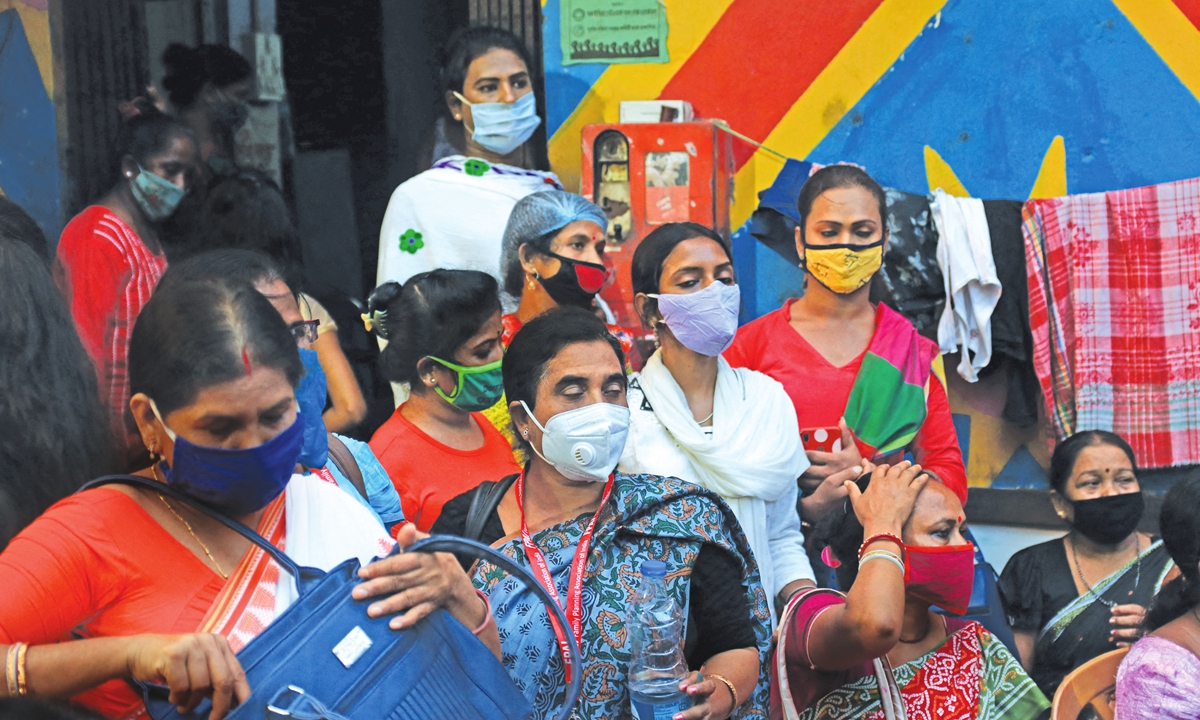“I had nothing left”: loan sharks target Indian sex workers affected by pandemic

[ad_1]
Indian sex workers wearing protective masks worship the Hindu goddess Durga in Sonagachhi, a red light district in Calcutta, India, October 21, 2020. Photo: AFP
As COVID-19 hit their incomes, hundreds of penniless sex workers in southern Andhra Pradesh have turned to unscrupulous lenders to survive the pandemic – most of them no did not have the necessary documents to qualify for formal bank credit, activists said.
“I had nothing left in my kitchen the day the lender approached me with a loan offer. He had a polite and reassuring manner and said there was no rush to pay the money back. “Said Baji, 26, who uses this pseudonym. Krishna district telephone.
“But he came back week after week. I paid off 1,200 rupees (about $ 16.50) on the loan itself, but when I stopped they ransacked my house and took all my utensils,” he said. the mother of two told Reuters. “It was traumatic.”
Before COVID-19 hit India, Baji was earning up to Rs 1,000 a day, enough to feed, clothe and shelter her children, but the 2020 lockdown pushed her and other workers in the country. sex, on the brink.
There are around 800,000 female sex workers across India according to government figures, but activists estimate the numbers to be much higher.
More than 100,000 are registered in Andhra Pradesh alone, according to figures from activists.
Reflecting concern over the plight of informal workers in India, the national human rights panel in October called on state governments to formally recognize sex workers, a move that would have enabled them to benefit from a state aid fund of $ 23 billion.
However, after the initial approval, the order was rescinded after critics said such a move would be illegal and risk legitimizing sex trafficking.
While sex workers have received food assistance, their lack of income has left many vulnerable to abuse by loan sharks, especially in Andhra Pradesh where authorities have been trying to curb widespread usury for years.
“Call for money”
Authorities in Andhra Pradesh, a state once known as the center of India’s microfinance industry, have attempted to regulate usury – widely known as “call money” racketeering for ease of use. ‘loan by phone.
Ten years ago, the state government put the brakes on microfinance activities after a wave of borrower suicides, and in 2015, it banned pawn shops from operating without a license after arresting around 200 people in because of allegations of harassment.
But industry analysts have said the shylocks – which charge high interest rates and resort to extreme means to collect debts – are in part the result of inadequate legitimate sources of credit in the state.
A collective representing 6,000 female sex workers in the state said more than three-quarters of its members were in debt. Many live under the constant threat of abuse from pawn shops.
“They are drawn to these lenders because they are not required to provide collateral or proof of identity. They start with small amounts that women can repay. Women feel confident. [and] borrow more, ”Devi said.
“This is how they are trapped.”
“These are unsecured loans. There is no one else to borrow money from, ”said Harsh Shrivastava, former director of the Microfinance Institutions Network, a self-regulatory organization for the microfinance industry.
Lenders routinely deduct 10 to 20 percent of the loan principal before even handing over the money, sex workers and police officials said.
But because they give loans without requiring collateral or documents, they are like a “god,” said Ram Mohan, co-founder of the charity HELP against trafficking.
“Women borrow from one to pay the other. They are trapped in this cycle of debt,” said Ram Mohan.
Officials with the state’s Criminal Investigation Department (CID) said complaints against pawn shops were common, although no specific complaints from sex workers were received.
Many of those falling behind on their debts are too afraid to go to the police if lenders become abusive or violent, activists said.
“Institutional loans are difficult to approach and they are informal and very flexible money lending, despite outrageous interest rates,” said PV Sunil Kumar, deputy director general of CID.
Baji entered sex work at the age of 17 as a single mother, having recently been abandoned by her abusive husband, but she had some optimism about the future until her debts. fly away at the height of the lockdown.
After the break-in, she was forced to work in a brickyard, earning a paltry 400 rupees for a 12-hour day.
This, too, was cut in half after a mound of bricks fell on his leg, requiring surgery costing 20,000 rupees.
His employer loaned him the money but deducted the reimbursements from his salary.
“We had problems in the sex work, but I was winning and I was able to survive and there was hope. I have nothing to look forward to now,” she said.
[ad_2]
